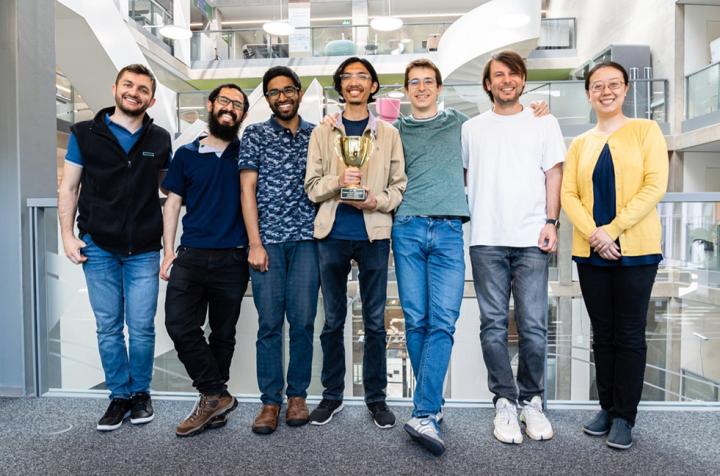EPCC Masters students take first prize in major international computing competition
A team drawn from EPCC’s MSc programmes has achieved a spectacular win in the international ISC Student Cluster Competition in Hamburg.
The annual ISC Student Cluster Competition (SCC) gives teams of university students a unique opportunity to showcase their expertise to the global computing community over three intense days. The event is renowned for its friendly, supportive atmosphere, despite fierce competition between the teams and the close attention of industry professionals.
Competition format
The ISC SCC format is designed to demonstrate each team’s abilities in designing their own computing clusters, systems comprising multiple high-speed computer servers (known as computing nodes) which when networked together can work in parallel to deliver high performance computing. The competition challenges teams to use their clusters to achieve the best performance when running a selection of benchmarks (software that tests the clusters’ core abilities) and scientific codes within a 6KW power usage limit.

Unique opportunity
The event offers a unique opportunity for students to push their skills and knowledge of high performance computing in a realistic, high-stakes environment while demonstrating their ability to work as a team under pressure. It is run as part of ISC High Performance, an annual major international conference that brings together the high performance computing, machine learning, data analytics, and quantum computing communities.
Students undertaking the Cluster Competition use the work as part of their dissertation and its preparatory phase, and there is a competitive selection process from within EPCC’s cohort of MSc students to join the team within a month of their arrival at EPCC.
The team successfully overcame hurdles including inadequate power supply and networking and hardware problems, but perseverance (and late nights) won through, and they were crowned overall winners at a ceremony at the ISC23 conference in Hamburg, Germany.
TeamEPCC
TeamEPCC comprised: Hristo Belchev; Ikraduya Edian; Jaffery Irudayasamy; Oleksandr Piekhota; and Tomas Rubio Cruz (all students of EPCC’s MSc programmes in High Performance Computing, and HPC with Data Science), and Kris Tanev (Edinburgh Napier University student intern). They were coached by Spyro Nita, an Applications Consultant at EPCC and previously a member of TeamEPCC at ISC in 2018, and Xu Guo, an EPCC Project Manager.
It was one of seven selected for the on-site competition at the ISC23 High Performance conference in Hamburg, Germany, with another 15 teams competing virtually. Their success built on the efforts of previous iterations of TeamEPCC, including the 2014 team which won the award for Highest Linpack, a test which measures the clusters’ floating-point computing power. This indicator of computer performance is particularly relevant to scientific computations. TeamEPCC was sponsored by Hewlett-Packard Enterprise (HPE) and supported by the EPCC systems team.
I think that what led us to winning was the collaborative spirit of the team as well as the drive of all its members - I felt like I was part of something much bigger than myself and that every member was giving their best to propel everyone forward.
To future students/team members: if you are motivated, have a passion for HPC and want to learn beyond the curriculum, joining TeamEPCC is the best thing you can ever do!
Being part of EPCC and being able to support our MSc students in HPC is a part of my career that I will remember for the rest of my life.
Related links
ISC HPC Computer Cluster Competition

